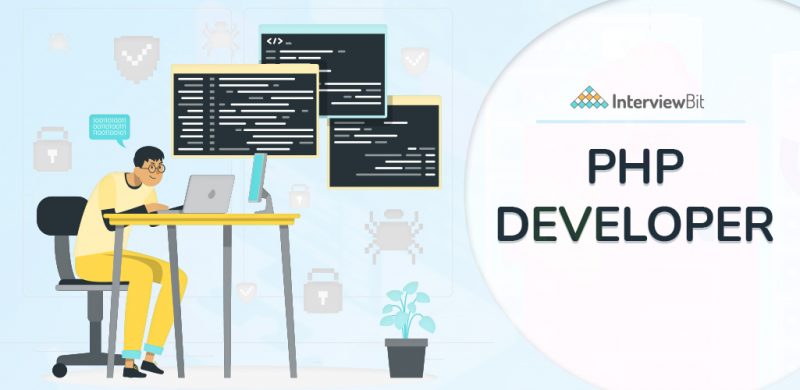- What is PHP Development?
- Who is a PHP Developer and What Does They Do?
- What is the Demand for this Role?
- PHP Developer Salary
- PHP Developer Career Path
- How to Become a PHP Developer?
- PHP Developer Skills
- PHP Developer Job Description
- Who Hire PHP Developers?
- PHP Developer Resume
- How to Prepare for PHP Developer Interviews?
- Conclusion
- FAQs
- Additional Resources
What is PHP Development?
PHP is the popular web scripting language that powers a major portion of the internet. PHP is the backbone of a vast number of websites and web apps that you see and consume over the internet daily.
Launched in 1994, PHP is an open-source general-purpose scripting language that focuses on web development i.e. creating backend of websites and web apps. Nonetheless, that doesn’t necessarily mean that it is limited to that only. In fact, it is used for command-line scripting and software development.
PHP code can be embedded into HTML. You can do so simply by adding <?php in HTML code. Everything that you write after this will be considered PHP code. To end the PHP code section in the HTML file we use ?>.
Confused about your next job?
PHP code is executed (interpreted, specifically) on the server. This generates HTML that is sent to the client (user). The user only gets the results and not the actual code.
The reason why PHP is still leading the web development scene from the forefront is that despite supereasy to start with, it features advanced functionalities that make life easy for seasoned web developers.
A PHP file has the .php extension and contains PHP tags. Although usually, PHP is leveraged for server-side scripting, it can do more, such as:
- Writing desktop and cross-platform applications using the PHP-GTK extension.
- Command-line scripting that allows you to run a PHP script without a server or web browser. For this, you require only the PHP parser. This is used typically for PHP scripts meant to be executed on Linux (cron) or Windows (Task Scheduler).
- Working with machine learning and artificial intelligence. The release of PHP 7.0 makes it more suitable for AI and ML. Platforms like Facebook, Slack, and Telegram allow you to build messenger bots with PHP.
Who is a PHP Developer and What Does They Do?
A PHP developer is someone capable of working with PHP and related technologies, such as MySQL, JSON, AJAX, XML, HTML etc. In addition to having a working proficiency in PHP, a PHP developer must be comfortable working with various PHP frameworks, such as CakePHP, CodeIgniter, and Laravel and PHP IDEs, like PHPStorm, ZendStudio, etc.
The typical job responsibility of a PHP developer includes:
- Defining the web app backend logic.
- Connecting apps with third-party web services.
- Using database knowledge, usually MySQL, together with PHP to manipulate the data (for example, applying CRUD operations) stored in the databases.
- Working in line with the front-end development team to integrate their work with the application(s).
- Designing, developing, and modifying the backend architecture that involves the components that determines the behavior of the website or webapp.
These professionals are also responsible for validating ideas and suggestions made by their managers and team members. PHP developers need to decide what is practical in terms of functionality and how to implement the same.
What is the Demand for this Role?
The demand for PHP developers is humungous, all thanks to the mushrooming size of the internet. With more and more websites and webapps making their seeing light of day, the increasing need for capable professionals that can ensure superior functionality is obvious.
A PHP developer with 5 or more years of experience can apply for the role of Senior PHP Developer or Team Lead, IT. To get more clarity into the demand for the role of PHP developer, here’s a screen of the PHP developer search query on Google Trends – India:
As you can see, the search query sees constant interest over the last 1 year. With the emergence of new organizations in the IT market, the opportunities for PHP developers have grown handsomely.
PHP Developer Salary
PHP developers are entitled to handsome salary packages, which is one of the reasons why it is one of the most sought-after professions. The average salary of a PHP developer in India is ₹277k per annum.
The remuneration, however, that a particular PHP developer receives is determined by a range of factors, namely organization, location, experience, and skill set.
Salary by Experience
The most important factor determining the PHP developer salary is experience. The more years of PHP programming experience you’ve, the better you’ll be paid. The following line chart and table gives a rough estimation of the average compensation that PHP developers in India are entitled to depending on their experience:
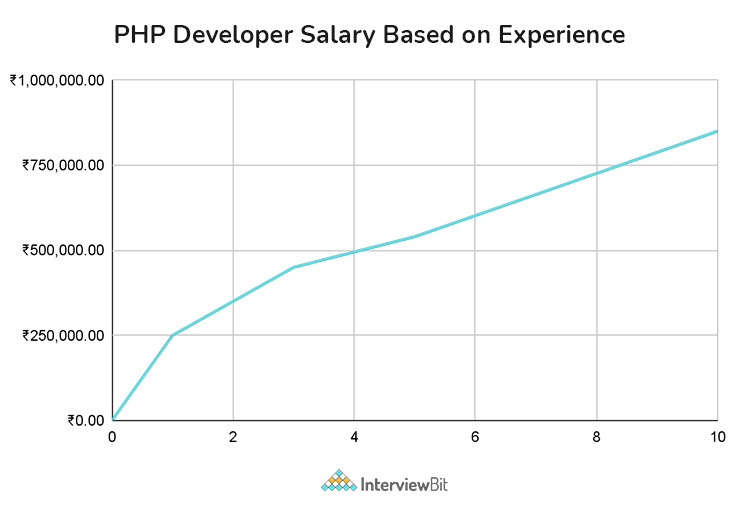
| Experience | Salary (Annualized) |
| No prior experience/Fresher to 1 year | Up to ₹250k |
| 1 year to 3 years | ₹250k – ₹450k |
| 3 years to 5 years | ₹450k – ₹540k |
| 5 years to 10 years | ₹540k – ₹850k |
| More than 10 years | ₹850k+ |
Salary by Location
Another important factor that impacts PHP developer salary is location. It is pretty obvious that big cities have more demand as well as better salary packages than small cities, however, they also have a higher cost of living too.
The following column chart and table enumerates the various popular cities for PHP developers in India and the respective average salaries:
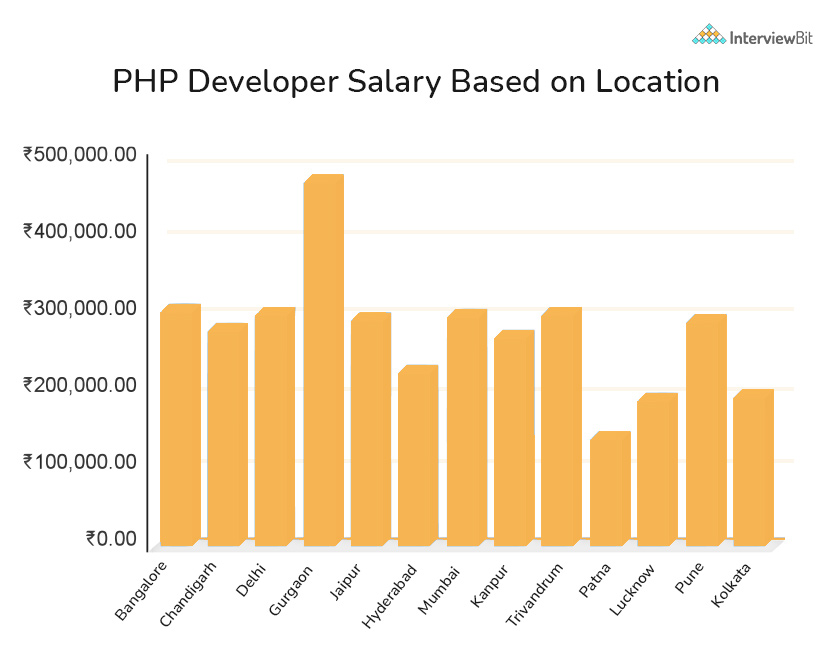
| Location | Salary (Annualized) |
| Bangalore | ₹306k |
| Chandigarh | ₹280k |
| Delhi | ₹300k |
| Gurgaon | ₹474k |
| Jaipur | ₹294k |
| Hyderabad | ₹225k |
| Mumbai | ₹298k |
| Kanpur | ₹270k |
| Trivandrum | ₹300k |
| Patna | ₹140k |
| Lucknow | ₹190k |
| Pune | ₹292k |
| Kolkata | ₹194k |
Salary by Company
Next, we are going to see PHP developer salaries based on the employer. IT organizations of all scales need PHP developers, may it be an MNC or a local IT firm. Remuneration offered to PHP developers by top organizations in India are demonstrated in the following bar chart and table:
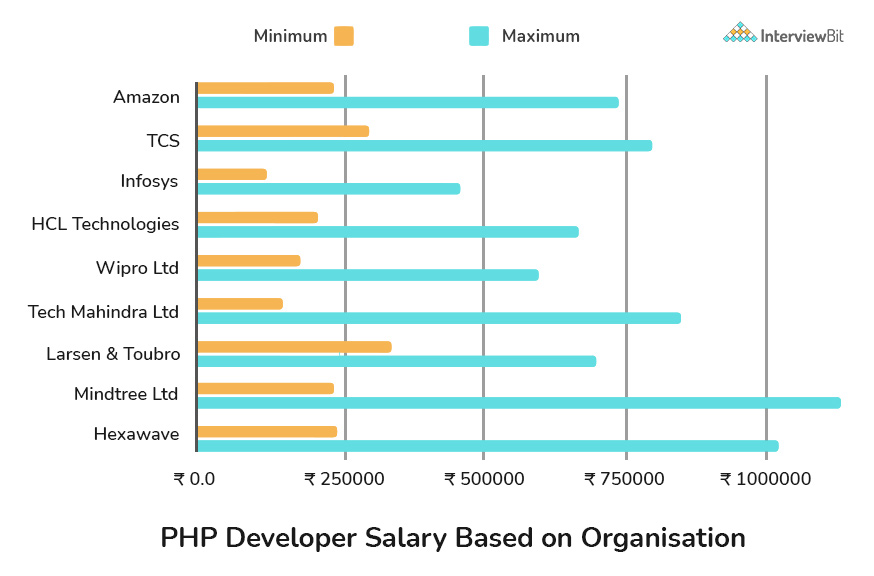
| Organization | Salary (Annualized) |
| Amazon | ₹240k-₹740k |
| TCS | ₹300k-₹800k |
| Infosys | ₹120k-₹460k |
| HCL Technologies | ₹210k-₹670k |
| Wipro Limited | ₹180k-₹600k |
| Tech Mahindra Ltd. | ₹150k-₹850k |
| Larsen & Toubro Infotech Ltd. | ₹340k-₹700k |
| Mindtree Ltd. | ₹240k-₹1130k |
| Hexaware Technologies Ltd. | ₹244k-₹1020k |
Salary by Skills
Good knowledge of complementary technologies is also well paid off in PHP development roles. The skills that you know and excel in along with PHP development also contribute towards the compensation that you will receive as a PHP developer.
Often, a PHP developer is expected to have a sound knowledge of JS, XML, JSON, AJAX, MySQL, etc. Hence the more skills you have the better it is when it comes to receiving the paycheck. Analyze the column chart and table below to know the remuneration amount for PHP developers based on skills:
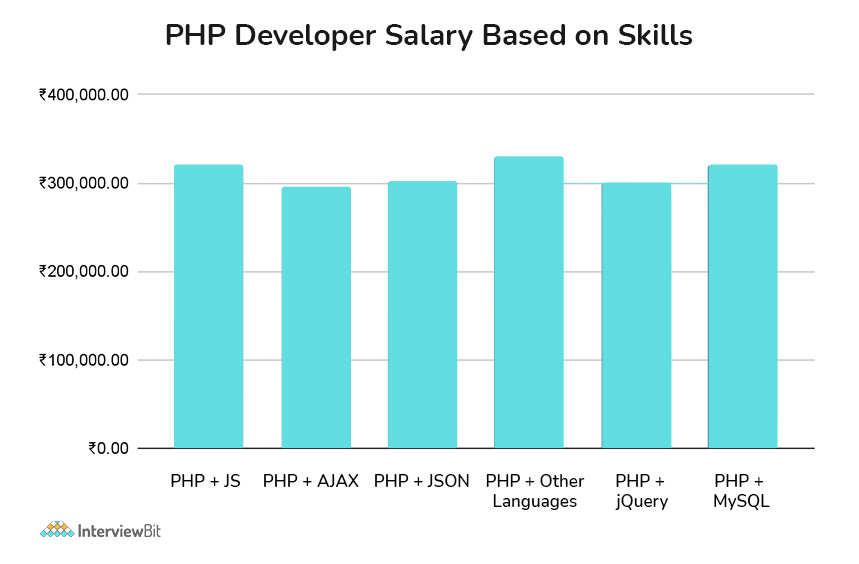
| Skills | Salary (Annualized) |
| PHP + JS | ₹320k |
| PHP + AJAX | ₹295k |
| PHP + JSON | ₹302k |
| PHP + Other Programming/Scripting Languages | ₹330k |
| PHP + jQuery | ₹300k |
| PHP + MySQL | ₹320k |
PHP Developer Career Path
After starting out as a PHP developer and working judiciously for a good amount of time, you can choose to work as a Software Developer or Senior Software Developer.
After several years of PHP development and project management experience, the next designation in the PHP development career ladder is Team Lead, IT or Lead Software Engineer, and Technical Architect. Average salaries for each of the job roles are summed up in the following bar chart and table:
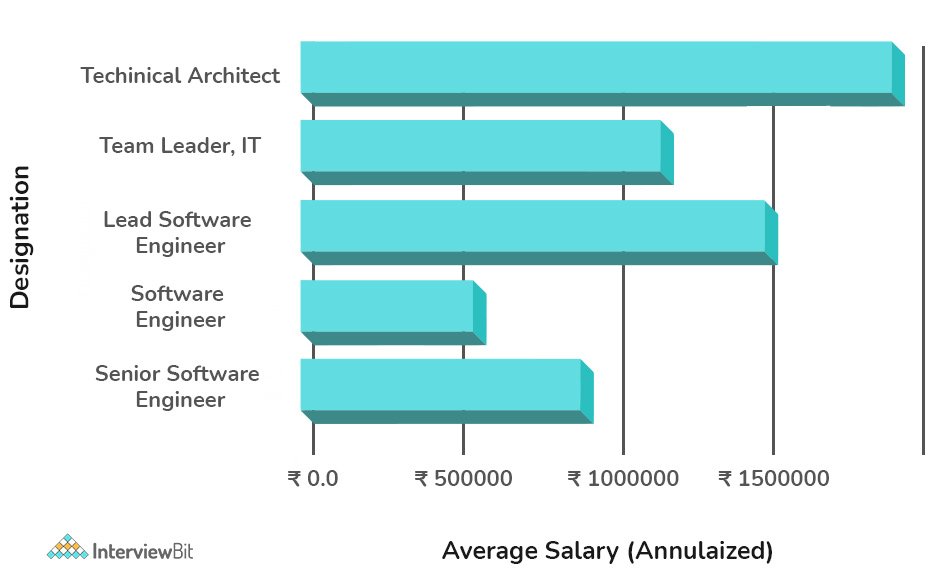
| Designation | Average Salary (Annualized) |
| Technical Architect | 1,933k |
| Team Leader, IT | 1,178k |
| Lead Software Engineer | 1,518k |
| Software Engineer | 564k |
| Senior Software Developer | 914k |
Know more about PHP developer salary here.
How to Become a PHP Developer?
The journey to becoming a PHP developer starts with academic qualification. After getting a degree in computer science or a related field, you need to start with the basics of programming, learn it by practice, and then advance to complex topics.
To make it simpler for you to understand how to become a PHP developer, here is the step-by-step procedure:
Step 1 – Get a Relevant Degree
You should have at least a relevant Bachelor’s degree before you set out to become a PHP developer. Although there aren’t any stringent qualification requirements to become a PHP developer, it’s beneficial to have a technical degree, such as B.Tech. in computer science or related field, BCA, MCA, M.Tech, and DOEACC ‘O’ Level.
In many cases, proven work experience in fields like computer programming and software engineering will be considered more than your educational qualification. Still, having a degree is preferable.
Step 2 – Learn PHP
Now, you are ready to learn PHP. You have to start with the basics of programming, data structures, and algorithms. If you have prior exposure to programming and/or web development then starting with PHP will be much easier. If you haven’t then don’t worry as many people don’t. So, how do you learn PHP? Well, there are several ways, including:
- Books and eBooks
- Online courses and tutorials
- Offline classes
- YouTube videos
- Seminars and webinars
- Blogs and websites
You can combine any of the above options as per your convenience and preference to make your PHP learning better. Start small though. Build a good grasp over the fundamentals and then work your way up i.e. learning PHP frameworks and related technologies such as AJAX and JavaScript.
While starting to learn PHP, it is important to choose a suitable IDE. An Integrated Development Environment is a tool that combines everything that you need for software/web development. Some popular PHP IDEs are:
- PHPStorm
- Zend Studio
- CodeLobster
- Eclipse
- NetBeans
- Microsoft Visual Studio
An IDE has a code editor that lets you write code with additional features such as syntax highlighting and code refactoring. IDEs also feature debuggers that let you find and resolve errors in your code. Some advanced IDEs even have project management features.
Please note that gaining information about the concepts in PHP is one thing and working on the same on your own is another. Just like with any other programming language, you need to learn it by practice i.e. try it on your own after learning. Check all the aspects and explore all the possibilities.
Step 3 – Work on PHP Projects
Once you’re ready to work with PHP, it’s time to indulge in PHP projects. There are projects of all levels that you can try to know how well you’ve learned PHP so far.
PHP projects can be categorized into basic, intermediate, and advanced categories depending on the knowledge that you’ll be required to invest to champion them. Basic PHP projects typically involve pure fundamental PHP knowledge.
Intermediate-level PHP projects require a little more than PHP basics. You need to know some advanced topics to successfully complete them as well as some knowledge of additional technologies like MySQL, jQuery, etc.
Advanced projects are those that demand a lot more than just PHP knowledge. These require knowledge of PHP-related technologies as well as analytical and problem-solving skills. Some of the popular PHP project ideas are:
- Hospital management system
- Weather app
- A personal blog
- A to-do app
Once you’ve completed a few PHP projects, you will feel a little more confident and also can show them to testify the prowess that you’ve built so far in PHP.
Check Out: Top Exciting PHP Projects With Source Code
Step 4 – Get Certified
The next step for becoming a PHP developer is to get a relevant certification. There are several PHP certification programs, offered by online learning institutions like Udemy and Coursera that will help you to verify your PHP knowledge.
Different PHP certifications will help you to testify your different types of working experience with PHP and at different levels. These certifications increase the value of your resume and give you an edge over candidates without a PHP certification(s).
Step 5 – Crack a PHP Developer Job Interview
So now that you’ve learned PHP, worked on projects, and are certified, it’s time to jump to the real thing i.e. crack a PHP developer interview and acquire professional experience. You can either give an interview for a PHP developer or a PHP developer trainee.
If you’re just starting out then the latter might be the best option as it will let you get real exposure to PHP development while going easy on expected job responsibilities from your side.
During the interview, you’ll be subjected to an array of questions to check your PHP knowledge, analytical and problem-solving skills, communication skills, et cetera. We will cover more about PHP interviews later in this article.
Please note that getting your first job as a PHP developer is just the starting. There’s a long way ahead to glory. After accumulating a few years of experience in PHP development you can aim for the role of Software Engineer, Senior Software Developer, etc.
PHP Developer Skills
A PHP developer must have a wide range of skills aside from PHP development. Usually, employers look for PHP developers with a familiarity with the object-oriented programming paradigm. A PHP developer must also be well-versed in MVC-based PHP frameworks.
Technical Skills
-> Other Programming Languages
In addition to PHP, a PHP developer must have a good understanding of front-end programming languages that includes CSS, HTML and JS. This will help the developer to detect and correct errors in the web design.
An understanding of these languages will also benefit the person to know how these affect user experience, which is an important aspect of web development.
PHP developers must have experience in developing and consuming web services as they have to use many third-party web services in PHP projects. A PHP developer must also be familiar with these concepts:
- Handling HTTP requests.
- Parsing JSON.
- Using XML.
- Using package installers like composer and pecl, etc.
Composer, for example, is a dependency manager that assists PHP developers in managing the various classes, functions, and libraries. It allows a PHP developer to effortlessly work with different versions of PHP depending on the project requirements.
PSR (PHP Standard Recommendation), issued by PHP-FIG, is a PHP specification that aims to standardize PHP programming as well as enhance the interoperability of PHP components and frameworks. There are more than 12 standards right now with more on the way. Following these helps PHP developers to cut the hassle caused by variations in PHP code.
-> Database Systems
Working with PHP also necessitates having a good grasp of database systems. Although MySQL is usually preferred, having a working knowledge of popular alternatives like Oracle Database and PostgreSQL is also a plus.
-> Testing Frameworks
Unit testing is vital for any PHP development. It can be applied in the TDD (Test Driven Development) approach. Here, tests are designed before the code is written. A great tool for the same is PHPUnit, a popular unit testing framework that automates testing small portions – units – of code.
DSA and Problem Solving
One of the important technical skills that you need to have in order to find success in your role as a PHP developer is problem-solving. It is required in all types of computer programming careers. Problem solving ability in software development manifests in the form of DSA.
DSA stands for data structure and algorithm. As a PHP (or software) developer, you are meant to come up with algorithms that are efficient and fast. Moreover, you need to choose the most suitable data structure for the problem at hand.
Non-Technical Skills
-> Interpersonal Skills
When working on team projects, it’s equally important to be able to easily communicate with your team members. Hence, you must have clear communication skills.
You should be able to show your work effectively. Many times during the project development, PHP developers might need to communicate with the clients and managers and understand their requirements as well as clearly convey issues.
As a PHP developer, you must be able to attend meetings with confidence via video conferencing or over the phone. Working ability with email and messaging apps is also mandatory.
-> Critical Thinking
Coming across unprecedented circumstances is normal during PHP development. You need to think out of the box, critically analyze a situation, and come up with possible solutions to advance.
-> Ability to Evolve
In today’s rapidly evolving market, it is important for PHP developers to regularly reskill and upskill. Therefore, they must be ready to learn and adapt according to the change in trends.
PHP Developer Job Description
The job description of a PHP developer varies depending on a range of factors, such as experience and organizational requirements. A typical PHP developer, however, has the following job responsibilities:
- Ensure seamless operations across web processes.
- Detecting and correcting errors relating to PHP code.
- Create PHP scripts to meet in-home and client demands.
- Develop and test client applications.
- Connect applications with third-party web services.
- Create precise documentation for various software, tools, and services.
- Write and modify PHP code.
- Work in line with the front-end developers of the web development team to integrate their work with the website and/or webapp.
In entry-level job profiles, the PHP developer is responsible for PHP code; writing and debugging. Management has no role here. It comes into play in mid- and senior-level profiles. Here, the PHP developer not only needs to write and maintain PHP code but also train and manage PHP code created by other developers in the team.
In senior-level PHP development, a PHP developer has to manage the projects. She has to ensure smooth functionality and effective communication among the various departments working on a common project(s).
PHP developers mostly develop back-end components. They are responsible for writing back-end web application logic. In some cases, they are even required to design and integrate plugins for PHP frameworks.
Who Hire PHP Developers?
PHP developers are hired by everyone, from big tech giants like Google and Microsoft to IT services providers like TCS and Infosys. Usually, companies that require PHP developers belong to IT.
Aside from big firms, MSMEs also look for dedicated PHP developers that can join their team and work on various in-home and client products and services.
PHP Developer Resume
Designing an immaculate resume is vital to grab the best opportunities in PHP development. You need to add your basic details, like name, address, and contact info. Also, you have to mention your academic qualifications and achievements. But don’t go into too many details.
A relevant PHP developer resume briefly explains all the technical and non-technical skills the candidate possesses as well as the various projects completed. You need to mention all the certifications and experience that you have briefly. An ideal PHP developer resume should be short and to the point.
Resume Formatting
Margin -> An impactful resume must have well-spaced margins. It shouldn’t be too much or too little. You must maintain a margin of 0.75-inch to 1.25-inch on all sides.
Font Style and Size -> There are several professional fonts you can choose, such as Arial, Calibri, Courier New, and Open Sans. Don’t use funky fonts like Comic Sans MS and Lobster. Keep font size 10-12 for normal text and 14-16 for headers.
Line Spacing -> It must be 1 or 1.15.
Length -> The resume shouldn’t be not more than 2 pages.
What to do?
- Keep it succinct.
- Add all the relevant experience, certifications, and project work.
- Using a formal tone.
- Include the career objective.
What to avoid?
- Using an informal tone.
- Typos and grammatical errors.
- Irregular spacing.
- Lengthy paragraphs and sentences.
- Irrelevant personal information.
- Detailed hobbies and interests.
How to Prepare for PHP Developer Interviews?
PHP has a vast range of topics that can be categorized into basics and advanced concepts. A PHP developer interview aims to assess a candidate for PHP knowledge, design patterns, and problem-solving ability. Some of the questions that you might be asked during a PHP job interview are:
- What is a session in PHP?
- Explain variables in PHP.
- How do echo and print differ in PHP?
- Highlight the advantages and disadvantages of PHP.
- Can you tell us about how PHP interacts with HTML?
- What is the importance of traits in PHP?
- What are the security features offered by PHP?
- How can you create cookies in PHP?
- How will you create a database with MySQL and PHP?
- Explain the steps to create an API in PHP.
- What is type hinting in PHP?
- Can you enumerate some design patterns in PHP? Why are they important?
These questions may not be the ones that might be asked during your interview, however, they will provide you with an idea of the kind of questions that you can expect coming your way during the PHP developer interview.
Aside from PHP, PHP development interviews involve checking a candidate’s proficiency in programming, data structures and algorithms, and PHP frameworks. Some examples of such PHP interview questions are as follows:
- Explain the various types of arrays in PHP.
- What is Zend Engine?
- What is a PHP framework? Can you name a few?
Get answers to the questions above and check out more top PHP interview questions and answers here.
Pro Tip:
- If you don’t have the answer to a particular question, admitting so honestly is a far better option than trying to maneuver around it and beating around the bush. Doing so, most of the time, puts off the interviewer(s). Therefore, remember, it’s not only your PHP prowess that is put to test during an interview but also your mental fortitude, straightforwardness, and communication abilities.
Conclusion
PHP developer is a lucrative work profile that demands a lot of effort and robust knowledge of PHP and other technologies. PHP development is a continuously evolving field, thus, you need to adapt to new ways to make your work better and efficient. As it is said, the more, the merrier. All the best!
FAQs
Q: Is a PHP developer a web developer?
A: A web developer is someone who is responsible for developing websites and webapps. This can be frontend or backend or full-stack development. Since PHP is a scripting language for the backend, PHP developers are responsible for developing backend logic and/or software and applications using PHP.
Q: Are PHP developers in demand?
A: PHP is the most-used scripting language for developing the backend for websites and webapps. More and more websites and webapps are entering the market every day. Consequently, the demand for PHP developers is also increasing.
Q: Is PHP better than Nodejs?
A: PHP is a scripting language. NodeJS, on the other hand, is a JS runtime environment that facilitates running JS code outside the browser. Both are among the most popular backend technologies. While PHP is ideal for server-side scripting, Nodejs is most suitable for developing modern web applications.
Q: How can I become good at PHP?
A: Practice is the key. Whenever you learn something in PHP ensure to test it out by writing code and developing programs. In this way, you will learn new concepts by practice. Moreover, stay updated with the latest PHP trends, such as newer PHP releases and the latest frameworks.
Q: What is PHP used for?
A: PHP is used mostly for developing the backend logic of web apps and websites. It is also used sometimes for software development, command-line scripting, virtual reality, and artificial intelligence and machine learning. PHP also powers some of the most popular content management systems, including WordPress, Drupal, and Joomla.


